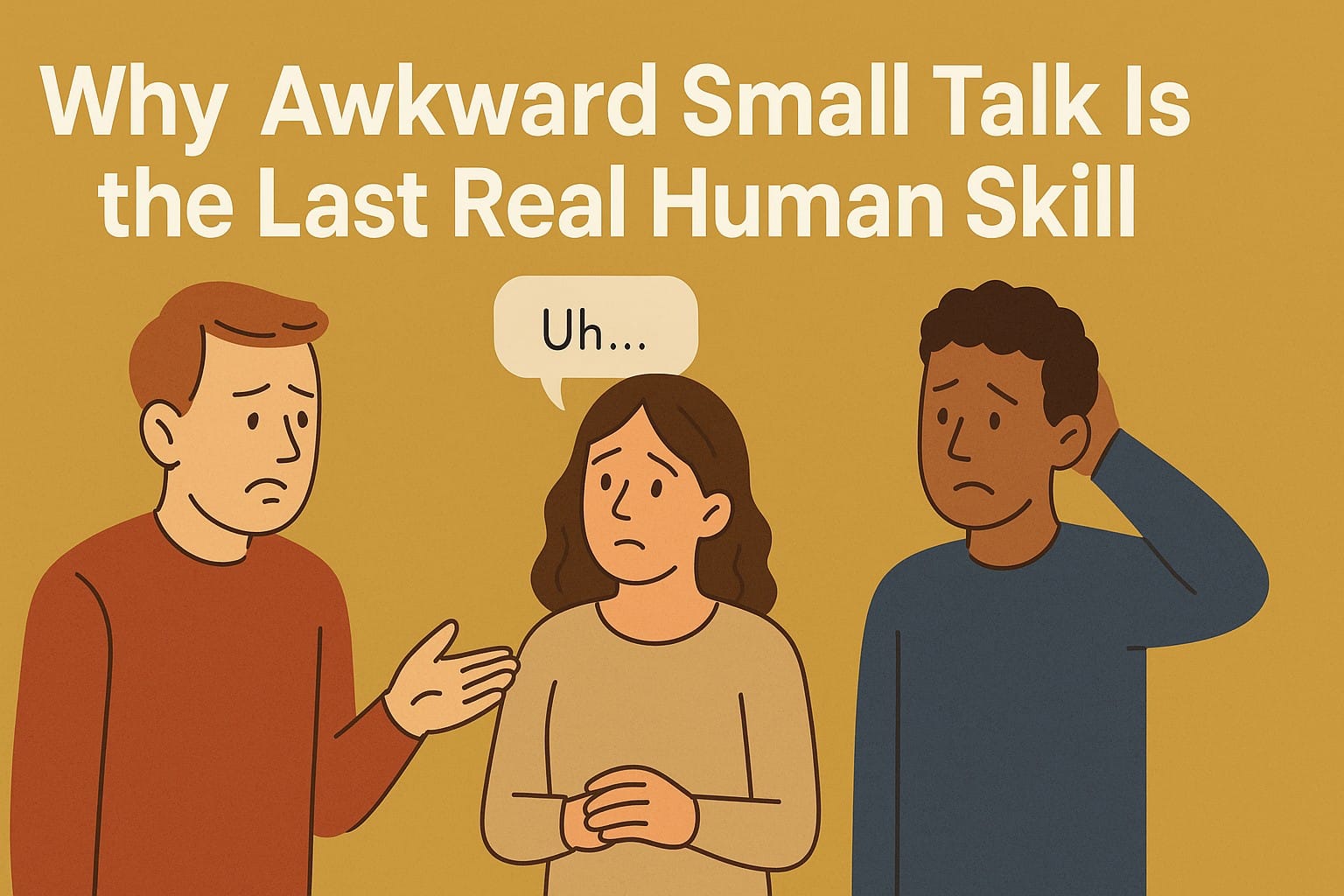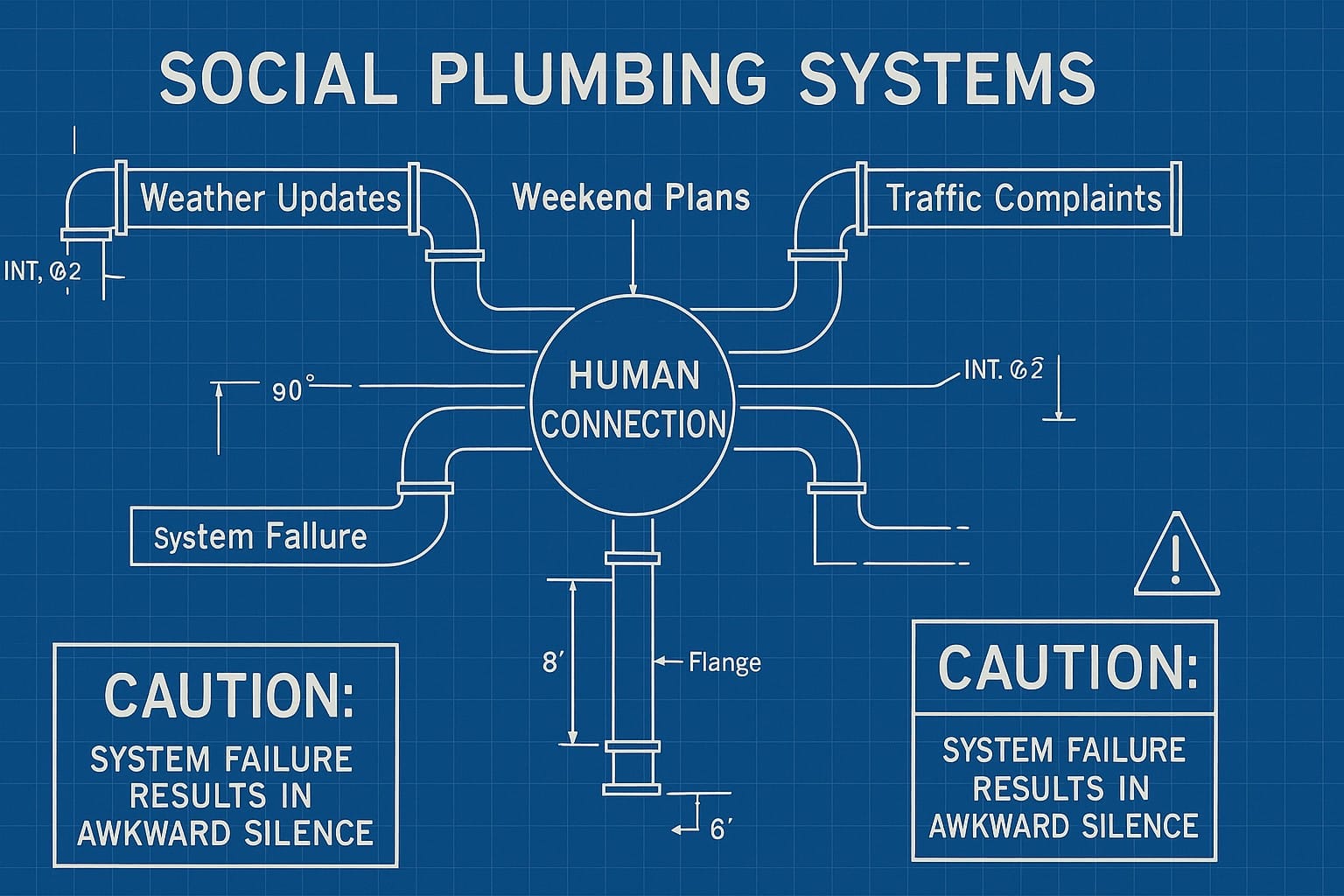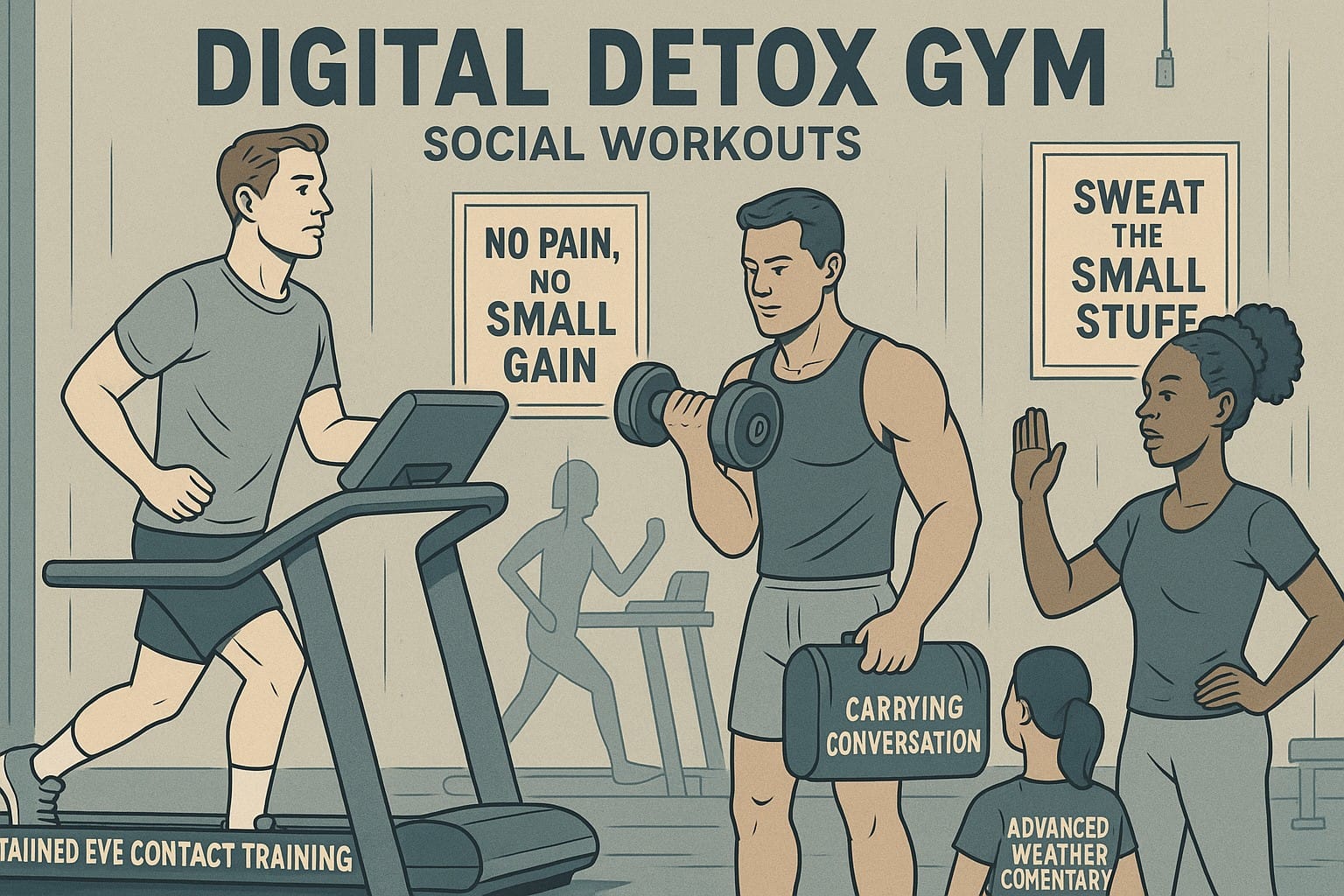Why Killing Small Talk Created a Generation of Conversational Sociopaths

Awkward small talk is the dodo bird of human interaction. Nobody gives a damn about it until it's gone, then we suddenly realize the conversational ecosystem has collapsed into a hellscape of unfiltered hot takes and people trying to turn grocery store lines into networking opportunities.
We're talking about that brand of social fumbling: weather updates delivered with all the enthusiasm of a hostage video, the strategic "totally, yeah" deployed like conversational tear gas, the bobblehead nodding that makes you look like you're having some kind of dashboard seizure. It's the participation trophy of human interaction. Nobody's proud of it, but it's somehow doing all the invisible work that keeps us from devolving into a planet where every conversation is either a TED Talk or a Twitter fight.
But here's the thing. We've been brainwashed into hating this supposedly primitive form of communication. Productivity gurus and optimization evangelists have declared small talk dead weight, a relic from back when humans were inefficient. "Skip the fluff," they bark, "go straight to authentic connection!" Which sounds brilliant until you realize they're advocating for the conversational equivalent of speed dating at a wake. Sure, it's possible. It's also completely missing the point.
The Unsung Infrastructure of Human Connection
This dismissive attitude completely misses what small talk does. It's the social equivalent of municipal plumbing: unglamorous, completely ignored, and critical until it breaks. Then suddenly everyone's a goddamn expert on what went wrong.
Think about the last networking event you survived. You weren't discussing the catering because you had revolutionary insights about cheese cubes. You were building a temporary shared reality with a total stranger, constructing a conversational bridge sturdy enough to hold two people who otherwise might view each other as fancy mannequins wearing name tags.
It's social lubrication at its finest. You don't dive into philosophical discussions about mortality without first confirming that yes, this elevator is moving with all the speed and urgency of continental drift. Skip that warm-up, and you're not deep. You're that person who corners strangers at parties to discuss their childhood trauma while they're desperately scanning for the bathroom.
The Democracy of Mutual Suffering
Here's what makes small talk brilliant: its universal appeal, which is to say its complete lack of appeal. Everyone hates it. Everyone does it. This isn't an accident; it's the most elegant feature of the whole system.
We're united by our shared misery. That thirty-second elevator hell where you both stare at the floor numbers like they're revealing the meaning of life? That's small talk doing precisely what it's supposed to do: proving you're both willing to acknowledge each other exist without making it weird. The words don't matter. The effort does.
Even "What do you do?" (that conversational fossil so overused it should be in a museum) works as a social handshake between strangers. Nobody cares about your job. They're signalling: I'm willing to burn thirty seconds pretending we might have something in common, even though my brain currently contains about as much original thought as a screensaver.
The Efficiency Trap and the Authenticity Scam
Why have we turned against small talk? Our cultural obsession with optimization has poisoned casual interaction. The hustle-culture gurus demand that every human exchange generate measurable value, preferably with KPIs and a PowerPoint presentation. We've been trained to see anything that doesn't produce immediate ROI as wasteful. Great for quarterly earnings, terrible for the messy business of being human.
Meanwhile, we've bought into a knockoff version of "authenticity" that mistakes emotional vomiting for genuine connection. The result? People who think dumping their unprocessed psychological baggage on random acquaintances counts as "keeping it real." Without small talk as a buffer, conversations become either business transactions or therapy sessions. It's like only having ice cubes and lava to drink.
Digital Communication: The Great Flattening
Digital communication made this worse. Online interaction performed surgery on the middle layer of human conversation, removing all the good stuff. Those tiny negotiations that happen in real space (the pause, the eye contact, the nervous laugh that buys you three seconds to think) got deleted from our digital toolkit.
The internet taught us to sprint from "Hello" to "Here's my entire worldview" in record time. We became conversational day-traders, burning through our social energy on the opening bell and wondering why we're exhausted by lunch.
This creates people who can debate Middle East policy through GIFs but panic when asked to comment on the weather without having a minor breakdown.

Awkwardness as Evolutionary Advantage
Here's the counterintuitive truth: the discomfort is the whole point. That moment when you both grab for the same stale conference donut and end up in a micro-ballet of embarrassment? That's not wasted time. That's empathy boot camp.
Awkward small talk works like a social gym. Low stakes, high practice value. It teaches you to read faces, match energy levels, and sit with discomfort without immediately diving for your phone like it's a life raft. Master a humidity conversation with a stranger, and you've got the emotional flexibility to handle the big stuff: money talks, political arguments, and those 2 AM conversations about whether you're wasting your life.
Except we're not practicing anymore. We're experiencing conversational muscle atrophy on a massive scale. Self-checkout killed the "finding everything okay?" ritual with cashiers. Food delivery apps murdered the "how's your night going?" exchange with pizza guys. Remote work replaced water cooler weather reports with Slack messages that could've been written by a depressed robot.
Every "unnecessary" human interaction got optimized into oblivion. And since small talk feels completely unnecessary, it died first. Here's the brutal irony: eliminating these "inefficient" exchanges didn't upgrade us to deeper conversations. We talk less. Period. It's like throwing away the training wheels and expecting to compete in the Tour de France immediately.
The Conversation Compression Problem
This connects to a massive misunderstanding about how human connection works. The promise of "cutting straight to the deep stuff" sounds fantastic, but it's complete bullshit. Picture a world where every stranger opens with "So, what's your relationship with death?" or "Tell me about your most devastating childhood memory." That's not depth. That's conversational assault.
We need the verbal cushioning because trust grows slowly. Real connection doesn't burst from someone's head like a fully formed idea; it develops gradually, fed by dozens of tiny interactions that prove you're both capable of basic social functioning. The "meaningless" chatter isn't filler. It's fertilizer for everything else that matters.
A Modest Proposal for Social Preservation
So what do we do? If we want to keep small talk from joining the extinct skills hall of fame (right next to reading maps and remembering phone numbers), we need to stop treating it like a guilty pleasure and start recognizing it as essential infrastructure.
This means choosing the slow checkout line on purpose and asking your barista how their morning's going instead of tapping to pay in silence, making weather observations to your neighbour, not because you're a meteorological genius, but because you're exercising the muscle memory of basic human connection.
Yes, it'll feel fake at first. Yes, some conversations will crash and burn spectacularly. But you're not just making small talk. You're maintaining the social contract that prevents us from becoming a society of isolated screen-addicts who only interact through delivery apps and passive-aggressive Nextdoor posts.

The Radical Act of Mundane Connection
In a world obsessed with speed, outrage, and algorithmic engagement, asking "How's your day going?" becomes a quiet act of rebellion. It's pushing back against forces that want to optimize human connection into targeted interactions designed to extract maximum value from minimum time investment.
Small talk reminds us that not every exchange needs to change your life. Sometimes, connection is just two people acknowledging they're both trapped in the same absurd situation, filling the air with words that don't matter individually but add up to something that does: the recognition that we're all just figuring it out as we go.
Awkward small talk isn't the enemy of authentic connection. It's the training ground where we learn to be human with each other, one uncomfortable weather observation at a time.
I don't sell memberships or anything, but if you want to buy me a beer, I won't refuse.


